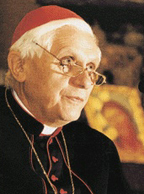April 21, 2005
The dictatorship of relativism (is and ought the western world)

Better to be up against White Guards than Mensheviks.
With White Guards, it is at least conceded that there is a war, now, and that there is no avoiding taking sides. On Menshevik clocks, the time is always 'not yet'. Postmodernism has translated Menshevitis - its vacillations and 'critique' - into a generalized condition and pseudo-ethical injunction. 'Who are WE to judge? 'How do we KNOW...?'
It is this that accounts for Zizek's well-known ambivalence about John Paul II: at least Wojtyla resisted secular liberalism's compulsory relativism. In this light, it has been fascinating to observe the liberal press's dismay about the election of Joseph Ratzinger as the new Pope.
The fiery sermon Ratzinger delivered on Monday - the last act in his unofficial campaign for the papacy - was a fierce denunciation of what he called, delightfully, 'the dictatorship of relativism'. Now that the period of media-piety is over, hacks have allowed themselves to raise a few eyebrows about Ratzinger's (in)famous intransigence on abortion, contraception, homosexuality and women. Needless to say, the new Pope's views are not in any substantive way different from those that 'shining moral example', his predecessor, but, waking up from their hagiographic stupefaction, the hacks now find themselves (surprise, surprise) at odds with those values. Worse even than the values themselves, it seems, is their aggressive certainity with which they have been assserted.
And so last week's apparent concordat between media and church has, predictably, fallen apart with indecent haste. The (con)temporary media need for a secular saint - someone who can be 'admired' without being believed or heeded - has run aground upon Ratzinger's defiant anti-populism. Today, the Independent, not sure whether to admire or abominate the stance, reported that Ratzinger would 'rather be right than be popular'. The liberal media's assumption has been that last Pope's 'reactionary' stance on sexual ethics was 'outdated' and would 'give way' to a more 'progressive' agenda, as if it is somehow only right and proper that the church should fall into line with contemporary 'morality'. Ratzinger has absolutely refused to entertain this agenda: the church's 'ought' should not be compromised by the world's 'is'.
Ratzinger, then, has done us this service at least: he has smoked out liberalism. (Of course, Ratzinger's denunciations of abortion, contraception and homosexuality - in line with long-standing Catholic doctrine, he does not condemn the 'inclination', merely the acting upon it - have little basis in the Bible, and are noxious authoritarian supersititions, but Ratzinger is well aware that the liberal calls for church reform are effectively calls for the church to abolish itself. Catholicism without authoritarianism would be ... Protestantism.)
It is clear that liberalism does not only reject Ratzinger's brand of non-wordly values; it rejects the very concept of values that are non-consensual or extra-worldly. That is because it holds it as axiomatic that (1) all values are re-negotiable because (2) the 'word', in all its flux and impermanence, must be the ultimate arbiter of what is right. By this means, postmodern liberalism attempts to deny the legitimacy, indeed possibility, of any values at odds with the worldly. In challenging this orthodoxy, Ratzinger's dogmatism amps up the antagonism that postmodern liberalism smothers under its passive-aggressive cloak. Could this presage a war between those who continue to insist that the worldly 'is' must be judged by the standards of an offworld 'ought'?
Posted by mark at April 21, 2005 07:39 AM | TrackBack